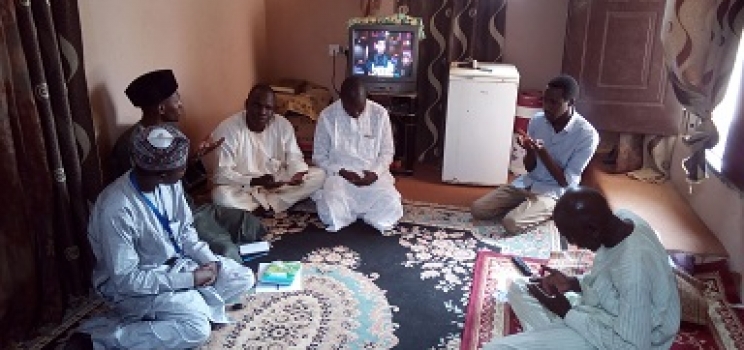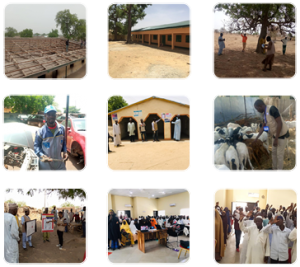Sensitization campaign reduce vulnerability to ISIS-WA’s Influence
This sensitization has opened my eyes to a whole lots of new things regarding how violent extremist groups are operating and recruiting our youths into their folds

opinion leaders listening attentively during sensitization lecture. Picture: CCDRN
June 2018 – 43-years old Ashatu Abubakar hails from Yaro community in Yunusari LGA of Yobe state, one of the areas where North East Regional Initiative (NERI) in partnership with Centre for Community Development and Research Network (CCDRN) is implementing the “building community resilience against violent extremist influence” initiative. Aishat, a prominent community women leader, is one of the beneficiaries of the project. She never had a formal understanding of how to effectively counter violent extremists influence or the ability to identify and rein in drivers of violent extremism despite her influential position as a women leader. Therefore, Aisha couldn’t contain her joy and appreciation for the rare opportunity to be part of a life changing intervention. “This is a one in a million opportunity. This sensitization has opened my eyes to a whole lots of new things regarding how violent extremist groups are operating and recruiting our youths into their folds” she said
More recently, the landscape of violent extremism in northern axis of Yobe vis-à-vis its growing influence is increasingly becoming complex and multifaceted. ISIS-WA and other factional group have devastated livelihoods in Nigerian Northeast. ISIS-WA’s evolving tactics and continuous recruitment drive coupled with lack of awareness and the knowhow by communities to counter their influence is making the crisis appears increasingly intractable. Taking place against a backdrop of obstinate social and economic vulnerability, ISIS-WA continues to succeed in its recent waves of attacks on military formations in northern Yobe and some border towns of Diffa region in Niger Republic. Most recently the daring kidnapped over 100 School girls in Government Science technical College Dapchi, the headquarters of Bursari Local Government area in Yobe State, coupled with the theatrical return of the girls in a Gestapo manner amidst cheers and hailing from locals, evidently indicates that they are beginning to gain inferred support from the civilian population who have been imperceptibly sold the idea of a harmless crusade against.
In the face of these experiments and rising influence of ISWA on the Yobe Corridor, USAID/OTI via North East Regional Initiative (NERI) in partnership with Centre for Community Development and Research Network (CCDRN) carried out a holistic project aimed at checking violent extremists influence through sensitization and community engagements. The project titled: Building Community resilience against Violent Extremist influence in Buluwa/Mar/Yaro ward of Yunusari LGA focused mainly on sensitizing 125 influential persons from five communities namely, GarinGada; Zaye; Yaro; Mashio and Bultuwa in Yunusari Local Government on the gambits of ISIS WA with a view to ensuring communities understand the operations of the terror group and its resultant consequences.
Twenty-five influential people where identified in each of the five communities for the activity. Aishatu Abubakar was one of them and she says of her experience, “We were trained on how to understand and reduce the influence of violent extremists groups and promote peace in our community. Due to implementation of this project, our youth have been mobilized and well informed about evil intentions of these groups and have been cautioned against having anything to do with them no matter the indulgence”. She said.
Speaking further on the unique change the project has brought to her community, Aishat said, “The level of youth involvement in Violent Extremists activities might have been worse in future time to come, if not for this intervention which has now opened the eyes of most of our community leaders. You can later compare the situation with communities that this project is not implemented and you will see the difference”
“This is coming at the right time considering what we have suffered at the peak of the insurgency and we don’t want to find ourselves in that kind of situation again. The knowledge this project has imparted on us will help keep extremists at bay” she continues
Aishat’s community and the four others were specifically targeted because of their proximity to where ISIS-WA is trying to exert influence and in addition, the sensitization campaign component of the project was carried out via a well-structured strategic behavioral communications tool which aided in discouraging communities’ empathy to ISIS-WA. To make it all inclusive, Traditional and religious leader were allowed to led discussions for community buy-in. The overall success recorded during the implementation of the project was partly due to the cooperation by key stakeholders, comprising LGA officials, security agencies, community, and religious and youth leaders who overwhelmingly accepted the project and supported its implementation in their respective communities.
“CCDRN has been a partner in tackling security issues through their projects and partnerships and i appreciated the gesture of a community-based approach of countering VE. This project will go a long way in reducing the level of community vulnerability to Violent Extremism in this area”. Says a DSS officer (name withheld) stationed in Yunusari LGA
The project which is largely community driven had an inclusive module whereby all relevant stakeholders are involved in the planning and selection of the target beneficiaries in each of the five communities. Aishat wasn’t the only one who shared her experience on the impact of the project. The Village head of Garin Gada, Mushe Lawan, believes that the implementation of the project is a great thing to happen to his community. “We wouldn’t have been properly enlightened if this project was not implemented in our community”. He said
Garin Gada, a focal community for this project, where lawan seats as the village head, suffers from poverty, poor infrastructure and limited opportunities, especially for youth. Joblessness and illiteracy creates fertile ground for the proliferation of extremist ideologies. Young people are driven to join extremist groups, ostensibly fueled by religious ideology, but often driven in part by social, economic and political marginalization
“The greatest challenge we faced in Garin Gada is that, most of our youth are economically handicap” Lawan said. Adding that “If the youth were given proper economic empowerment it will go a long way in building the community resilience and diverting their minds from the calls and activities of VE groups”
The village head’s experience with the project, just like the other beneficiaries, was a potent one. He followed through with the project from advocacy visits to sensitization meeting as well as the ward level dialogue. After gaining some insight, he committed to ensuring the sustainability of the project. “This project has yielded a positive result, especially on our youth. Now, involvement in drug abuse has been dramatically declining. Even the hard drugs vendors had been warned and sanctioned, their number is now declining also and this is thanks to this project that has further united us to deepen what we have been doing as a community”
“We would continue to sustain this project and it’s for our common good. Already our ongoing effort in the area of sustaining our association has been boosted by this project. We shall continue with community mobilization. We have been extending the knowledge we acquire to our community members in order to have sustainability of the initiative.” Lawan added
Following the implementation of this project which targeted 125 influential community members and opinion leaders for sensitization on how to build resilience to the rising ISIS WA influence, things are gradually taking shape in the five communities as conscious effort is being made by the beneficiaries to take the messages down to other community members especially young people who are more vulnerable to radicalization by extremists group.
USAID/OTI| has been working via NERI in Nigeria alongside partners to reduce vulnerability to violent extremism (VE) by strengthening the capacity of communities, thereby increasing credible moderate voices, and swelling community cohesion in areas at greatest risk of violent extremist influence.

